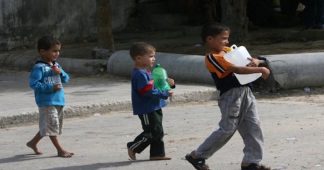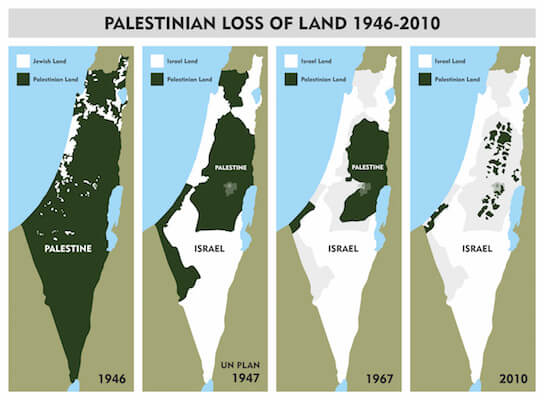“The gap between Europe’s rhetoric on illegal settlement growth and our actions is widening. We have reached a nonsensical situation where we are economically and financially sustaining the very obstacles to peace we so often condemn. This new report brings together powerful and pragmatic suggestions for a change in policy to truly advance peace,” said Chris Doyle, Director of Caabu.
Broad coalition calls on Europe to move decisively beyond rhetoric on settlements
The European Union imports fifteen times more from Israel’s illegal settlements in the Occupied Palestinian Territory than from Palestinians themselves, a new report [1] from a coalition of 22 non-governmental organisations including Caabu, Christian Aid UK and Ireland, the International Federation for Human Rights (FIDH) and Diakonia revealed today.
The report, entitled “Trading Away Peace: How Europe helps sustain illegal Israeli settlements”, is the first to compare available export data from Israeli settlements and Palestinians, highlighting the inconsistency at the heart of EU policy. The EU states, “settlements are illegal under international law, constitute an obstacle to peace, and threaten to make a two-state solution impossible” [2], but continues to provide a primary export market for settlement products. Most EU Member States have failed to ensure products are correctly labelled in stores, leaving consumers unaware of the products’ true origin, contrary to the EU’s own directives. [3]
“Europe says settlements are illegal under international law and yet continues to trade with them. Consumers are unwittingly contributing to the injustice by buying products that are inaccurately labelled as coming from Israel when in fact they are from settlements in the West Bank,” said William Bell, Policy and Advocacy Officer at Christian Aid UK and Ireland.
The report, which has a foreword by the former EU Commissioner for External Relations, Hans van den Broek, calls on European governments to adopt a range of concrete measures to stop assisting settlement expansion and close the gap between words and practice. At a minimum, the coalition is calling for clear labelling guidelines to ensure European consumers do not unknowingly buysettlement goods. [4] Such guidelines already exist in the UK and Denmark. [5]
Trade with settlements has been on the EU agenda since May, when EU Foreign Ministers strongly criticised “the marked acceleration of settlement construction” and for the first time called for full application of existing EU legislation regarding products from settlements. [6]
The Israeli government estimates the value of EU imports from settlements at around €230m a year [7]; compared to €15m a year from Palestinians. [8] The discrepancy is partly driven by Israel’s policy of providing large subsidies to settlers [9], including for infrastructure, business development, and agriculture while imposing stringent restrictions on the Palestinian access to markets and resources.
Settlers enjoy easy access to international markets, and have established modern agribusinesses and industrial zones. In contrast, the Palestinian economy is “severely constrained by a multi-layered system of restrictions” [10] imposed by Israel, including roadblocks, checkpoints and limited access to land, water, and fertilisers. As a result, Palestinian exports have fallen from over half of GDP in the 1980s to less than 15% of GDP in recent years [11], effectively invalidating the EU’s preferential trade agreement with the Palestinians.
“The EU spends hundreds of millions of euros in aid each year to support Palestinian state building but then undermines this assistance by trading with illegal settlements, thus contributing to their viability and expansion,” said Dr Phyllis Starkey, former British MP and Trustee of Medical Aid for Palestinians.
Among the settlement goods that are on sale in Europe are dates, grapes, citrus fruits, herbs, wines, cosmetics from Ahava, some of the carbonation devices from SodaStream and some of the plastic garden furniture produced by Keter.
“Goods from West Bank settlements are produced on the back of house demolitions, land confiscations, and military occupation. Governments need to finally move beyond rhetorical condemnations of settlements and at the very minimum ensure consumers can make informed decisions about these products in shops. This is nothing but abiding by European and international law,” said Souhayr Belhassen, President of the International Federation for Human Rights (FIDH).
Ends
For more information, to arrange interviews :
Chris Doyle, Director, Caabu
07968040281
Signatory organisations:APRODEV, Broederlijk Delen (Belgium), Caabu (UK), CCFD – Terre Solidaire (France), Christian Aid (UK and Ireland), Church of Sweden, Cordaid (Netherlands), DanChurchAid (Denmark), Diakonia (Sweden), International Federation for Human Rights (FIDH), FinnChurchAid (Finland), ICCO (Netherlands), IKV Pax Christi (Netherlands), Medical Aid for Palestinians (UK), medico international (Germany), medico international switzerland, The Methodist Church in Britain, Norwegian People’s Aid, Norweigan Church Aid, Quaker Council for European Affairs, Quaker Peace and Social Witness (UK), Trocaire (Ireland)
EDITORS NOTES:
[1] With more than 4 million Palestinians and over 500,000 Israeli settlers living in the Occupied Territory this means the EU imports over 100 times more per settler than per Palestinian. Source of figures: see below.
[2] E.g. here: http://www.consilium.europa.eu/uedocs/cms_data/docs/pressdata/EN/foraff/…
[3] http://eur-lex.europa.eu/LexUriServ/LexUriServ.do?uri=OJ:L:2005:149:0022…http://www.europarl.europa.eu/sides/getAllAnswers.do?reference=E-2010-26…
[4] Further, more comprehensive measures recommended in the report include:
- excluding settlements from benefits of bilateral agreements and cooperation programmes
- actively discouraging corporate involvement in settlements
- preventing financial transactions to settlements
- banning imports of settlement products
[5] The guidelines should be extended to also cover non-food products. UK guidelines issued in December 2009: http://archive.defra.gov.uk/foodfarm/food/pdf/labelling-palestine.pdf . Danish guidelines just issued on 5 October 2012: http://www.foedevarestyrelsen.dk/Foedevarer/Maerkning/Oprindelsesmaerkni…
[6] http://www.consilium.europa.eu/uedocs/cms_Data/docs/pressdata/EN/foraff/…, p. 12.
[7] Figure provided by the Israeli Foreign Ministry to the World Bank in 2012, represents approximately 2% of total Israeli exports to the EU. See: http://siteresources.worldbank.org/INTWESTBANKGAZA/Resources/AHLCReportF…, p. 13.
[8] 5-year average for 2007-2011. http://trade.ec.europa.eu/doclib/docs/2006/september/tradoc_113382.pdf. With more than 4 million Palestinians and over 500,000 Israeli settlers living in the Occupied Territory this means the EU imports over 100 times more per settler than per Palestinian.
[9] According to a recent estimate, the government spends €330m a year on settlements above the level of benefits provided to citizens inside Israel. http://settlementwatcheastjerusalem.files.wordpress.com/2012/07/peacenowsavingsplan.pdf
[10] http://siteresources.worldbank.org/INTWESTBANKGAZA/Resources/AHLCReportF…, p.11.
[11] http://www.imf.org/external/country/wbg/RR/2010/041310.pdf, p. 4.











